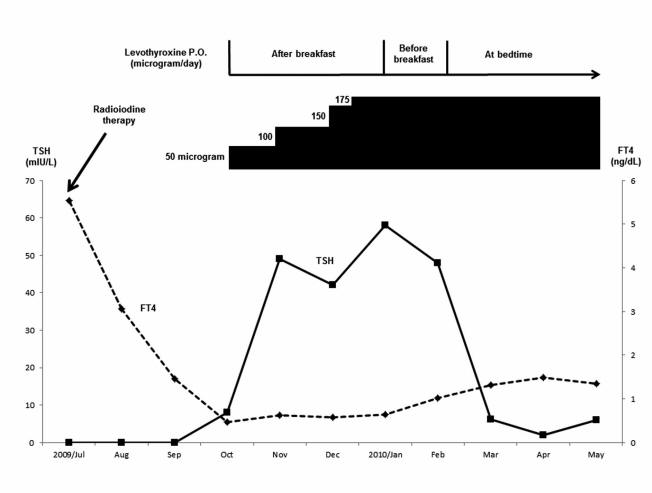The questions about when to take levothyroxine keep coming - and that is not surprising! The Patient Information Leaflets, most written information, doctors, nurses and most everything else is so stuck with taking levothyroxine in the morning, it isn't a matter "thinking" that it is right. It is a matter of not even questioning it. Not having the slightest notion that there could be an alternative.
This paper is one of several which suggest that, at least for some people, taking at bed-time could make a difference - in this particular case, a profound difference.
This is not the answer for everyone. Some do well - some seem not to do so well.
Marked Improvement of Levothyroxine Malabsorption by Simply Changing the Timing of Thyroxine Ingestion in an Adult Woman With Hypothyroidism After Radioiodine Therapy for Graves’ Disease
Yoji Miyoshi
Corresponding address: Division of Endocrinology, Diabetes and Metabolism, Sayama General Clinic, 4-15-25 Irumagawa, Sayama, Saitama 350-1305, Japan
Manuscript accepted for publication December 13, 2012
Short title: Timing of Levothyroxine Ingestion
doi: dx.doi.org/10.4021/jem129w
Abstract
We report the case of a 37-year-old woman suffering from hypothyroidism resistant to oral levothyroxine (LT4) substitution after radioiodine therapy for Graves’ disease. She was admitted to our endocrinology clinic for persistent hypothyroidism despite administration of full-dose LT4 (175 mg/day). The patient complained of severe general fatigue, leg edema, and body weight gain. Her serum free thyroxine (FT4) and thyrotropin (TSH) levels were 0.64 ng/dL and 58.0 mIU/L, respectively. Extensive investigations excluded disease of the small bowel, liver, and pancreas, as well as drug interactions. She also had no gastrointestinal diseases (for exmple, ulcer, inflammatory colitis). We were also able to rule out failure to take LT4 and concomitant use of other drugs. One month after changing the timing of LT4 ingestion from after breakfast to before breakfast, her serum TSH level did not decrease and her serum FT4 level increased from 0.64 to 1.02 ng/dL. The symptoms of hypothyroidism remained unchanged. We then changed the timing of LT4 ingestion from morning to bedtime. One month later, her serum TSH level had normalized and signs of hypothyroidism had disappeared. This case emphasizes the clinical importance of the timing of thyroxine ingestion in not a few patients with hypothyroidism resistant to LT4, although the reason for the malabsorption in this patient remains unclear.
Keywords: Hypothyroidism; Malabsorption of thyroxine; Timing of thyroxine ingestion
jofem.org/index.php/jofem/a...
Rod


